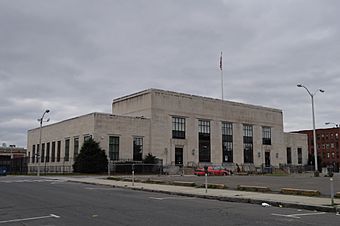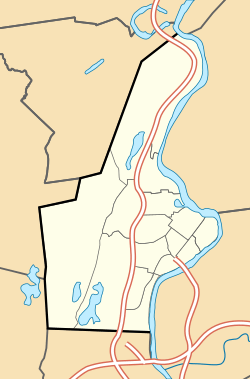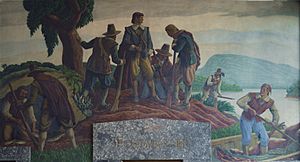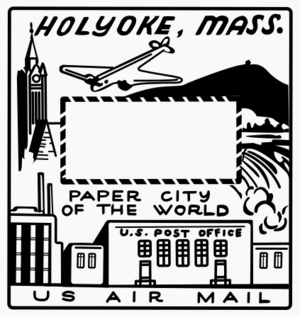United States Post Office–Holyoke Main facts for kids
Quick facts for kids |
|
|
US Post Office—Holyoke Main
|
|

US Post Office-Holyoke Main
|
|
| Location | 650 Dwight St., Holyoke, Massachusetts |
|---|---|
| Area | 1 acre (0.40 ha) |
| Built | 1933 |
| Architect | Alderman, George P.B., & Co.; James, Thomas M., & Co. |
| Architectural style | Art Deco |
| NRHP reference No. | 86000122 |
| Added to NRHP | January 21, 1986 |
The US Post Office—Holyoke Main is a special old building in Holyoke, Massachusetts. You can find it at 650 Dwight Street. It opened in 1935 and replaced an older post office. This building is a great example of Art Deco style, which was popular back then. Because it's so important, it was added to the National Register of Historic Places in 1986. This list helps protect important places in the United States.
This building is one of two post offices in Holyoke. The other one is in Ingleside at the Holyoke Mall.
Discovering the Holyoke Post Office
Holyoke's main post office is right in the middle of the city. It's on Dwight Street, between Elm and Chestnut Streets. The building is large and has two floors. It was built with a strong steel frame. The outside is covered in light-colored limestone with dark granite details.
The middle part of the building is taller and has five sections. On each side, there are smaller, one-story wings. The main entrances are in the outer parts of the central section. Above each door, you can see a window and a carved eagle.
Inside the Post Office: Art and Design
When you step inside, you'll see a beautiful main lobby. The floor is made of shiny marble. The walls have marble up to a certain height, and the rest is smooth plaster. Near the top, there's a fancy carved edge.
One of the most interesting things inside is a large painting on the wall. This mural shows the early history of Holyoke. It depicts Elizur Holyoke and other explorers looking at the area in the 1600s.
Building History and Special Art
The Art Deco style of this building is quite rare in Holyoke. It cost about $284,000 to build, including the land. The beautiful mural inside was painted by an artist named Ross Moffett. This artwork was part of a special program during the Great Depression. This program helped artists find jobs during a tough time.
Choosing where to build the post office was a bit tricky. People in Holyoke had different ideas about the best spot. The Postal Service even thought about canceling the project if they couldn't agree! The second floor of the building used to have other government offices. Today, much of that space is not used.






